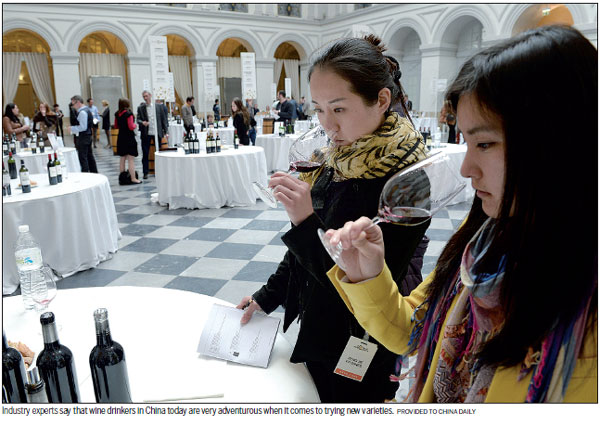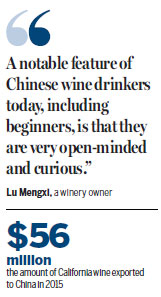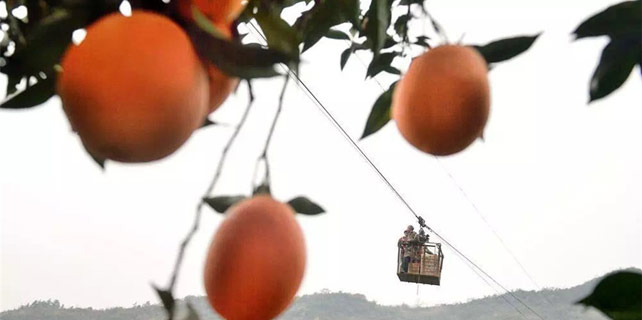Top of the grapevine
Zinfandel, a California wine with a robust flavor, is quickly growing in popularity in China - and it's the young women professionals who are driving demand

As Asia Director of the California Wine Institute (CWI), a non-profit organization that helps promote the regional produce, one of Christopher Beros' biggest challenges in China these days is not the lack of people who appreciate the alcoholic beverage.
Rather, it is a severe shortage of chairs, and it is a problem he is more than happy to have.

The institute's master classes on Zinfandel wine in China's major cities have constantly been oversubscribed. Beros said that the class held last month in Beijing only had the capacity for 80 participants. The session was overbooked by 150 percent, and within just two hours.
Widely regarded as the most American of grapes, Zinfandel - it is characterized by a bold and distinctive fruit-forward profile - has been grown primarily in California for the past two centuries.
In China, despite a relatively late introduction in 2010, Zinfandel has become an instant hit especially among young women professionals from major cities, the demographic with the biggest purchasing power.
Beros said that the situation today is a stark contrast to 2007 when he first started his wine importing business in Shanghai. Then, sales of Zinfandel had languished behind the likes of more conventional types like Cabernet and those originating from Bordeaux.
Fast forward seven years to 2014, the entrepreneur had found himself selling more Zinfandel wine in Shanghai than all the other varieties from his home state of California.
According to the CWI, the Chinese mainland imported $56 million worth of California wine in 2015, the fifth largest amount in the world after the European Union, Canada, Japan and Hong Kong. Up to 90 percent of US wine being exported to other countries is originally from California.
In the first half of this year, though overall exports of California wine had dropped 4.47 percent, exports to China actually grew by 53.72 percent year-on-year.
Beros pointed out that while export values and volume don't necessarily translate to actual sales, the sales of California wine in China market still look promising as many importers and dealers have reportedly sold more bottles than they have in stock.
Some industry players have attributed the growing popularity of Zinfandel in China to the black-skinned grape's translation in Chinese: xian fen dai. The first two Chinese characters, when individually translated, mean "fairy" and "pink" respectively. The last character refers to a term used during ancient times to describe the color of a woman's eyebrow.

Many industry experts also note that the popularity of Zinfandel reflects a major shift in consumption patterns in China's wine industry - the main consumers of wine in the country are now cosmopolitan women with considerable spending power, instead of middle-aged businessmen and government officials. A report by CBN Data has shown that women aged between 23 and 35 are the most frequent and curious wine drinkers in China.
"A notable feature of Chinese wine drinkers today, including beginners, is that they are very open-minded and curious. In the past, they would always ask for something they have heard of. Now, they love entering unknown territory and trying new varieties," said Lu Mengxi, whose family owns a winery in Ningxia Hui autonomous region.
Debra Meiburg, director and founder of Meiburg Wine Media in Hong Kong, believes that Zinfandel's fruity and robust flavor, which goes well with spicy Sichuan cuisine and hot pot, is another reason why the wine has won over the hearts of many Chinese drinkers.
"There are still significant opportunities for California wineries to broaden their reach and presence in China. We have seen increased focus and activity by California wine representatives in China recently. They are investing substantial time, efforts and resources into building relationships with wine importers and lovers," said Meiburg, a native of Sonoma County, California who is also an award-winning wine journalist.
According to industry insiders, many California wineries are expanding into China mainly to raise brand awareness instead of sales figures as the demand for California wine back in the US, the world largest consumer market of the beverage, has already outstripped supply.
However, Ian Ford, co-founder of wine importer company Summergate in Shanghai, is confident that Chinese wine consumers won't be left thirsty.
"It's true that at the luxury end of the spectrum, the American market would easily consume most or all of the fine wine made in California. But California's vignerons are keen to develop the China market, particularly those in the core cities," said Ford.
Beros shared the same sentiment, saying that wineries would not be investing so much money and effort in China if they weren't confident they could supply the coveted beverage to consumers here.
xujunqian@chinadaily.com.cn









